
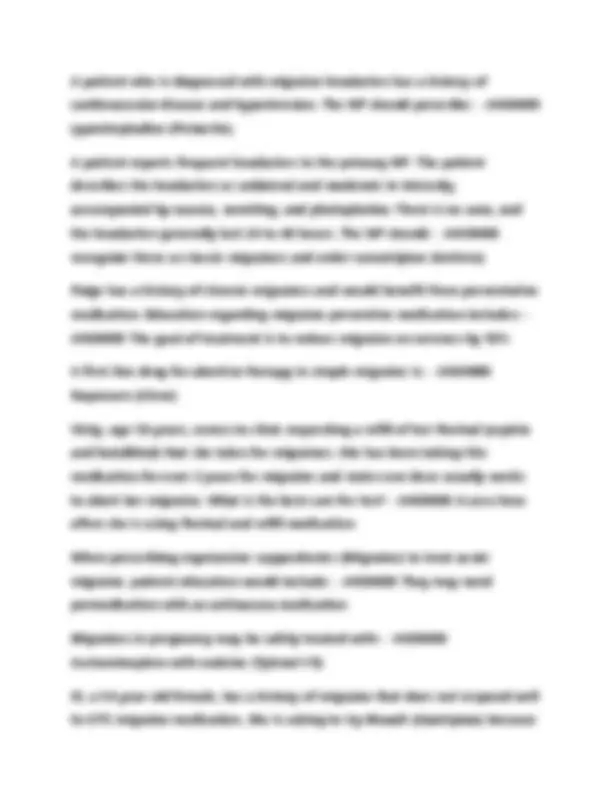
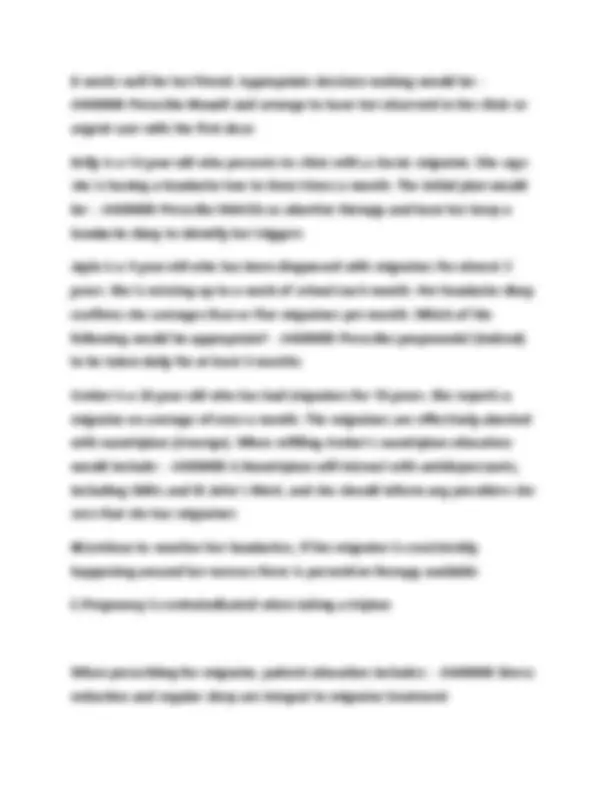
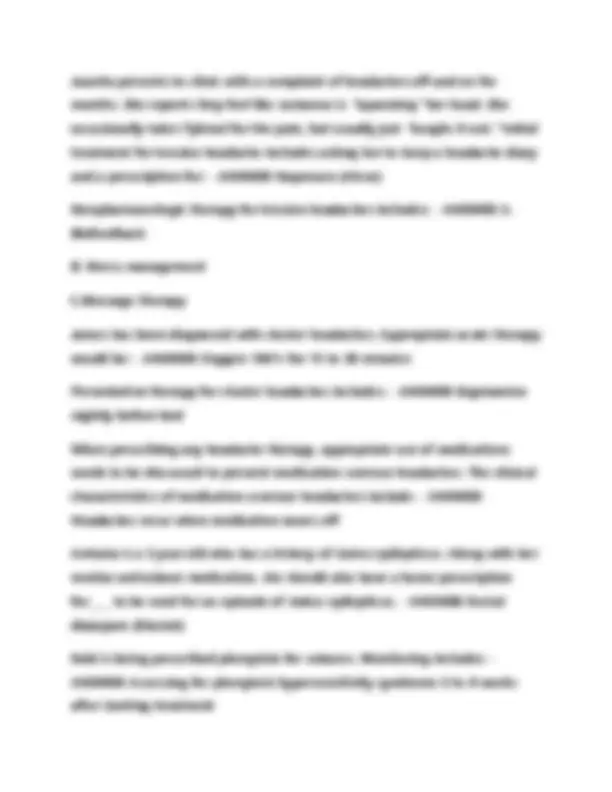
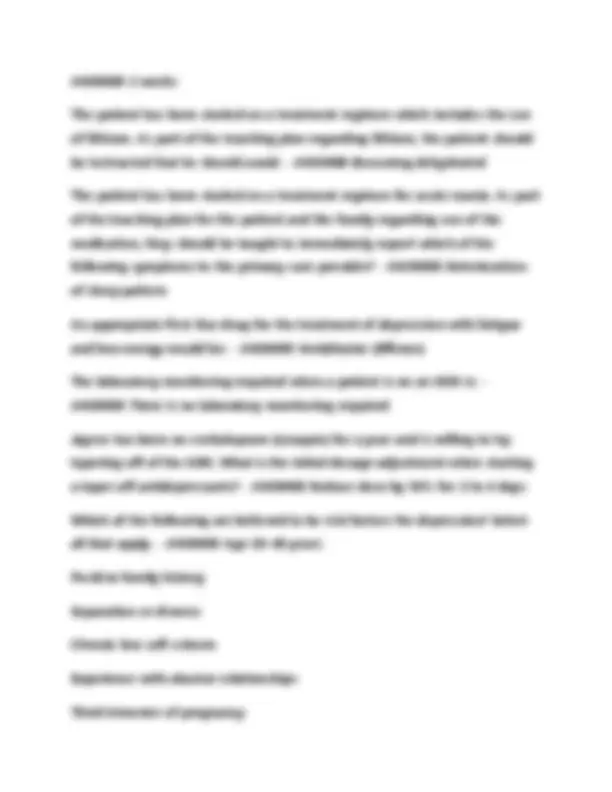
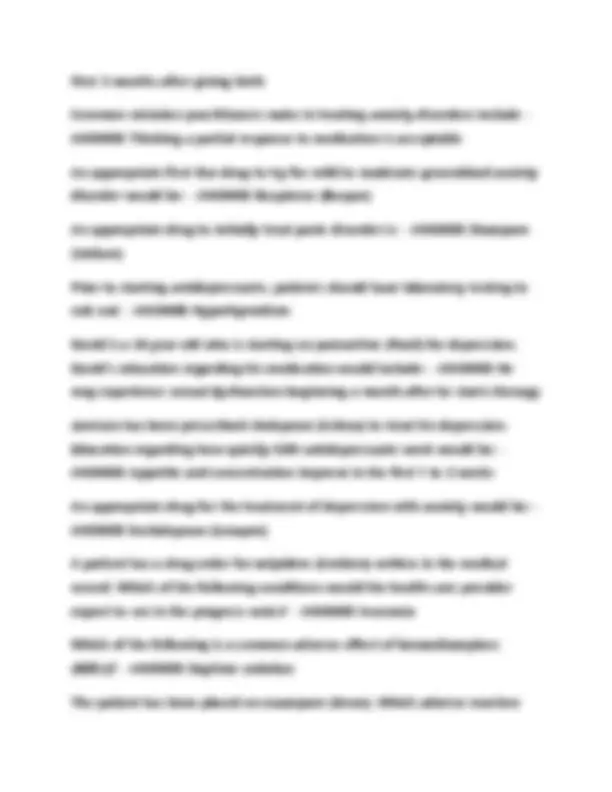
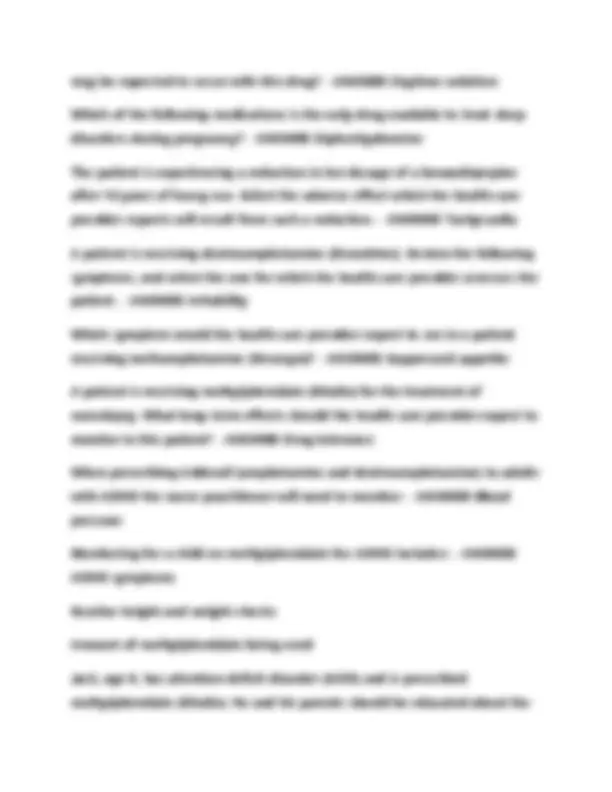
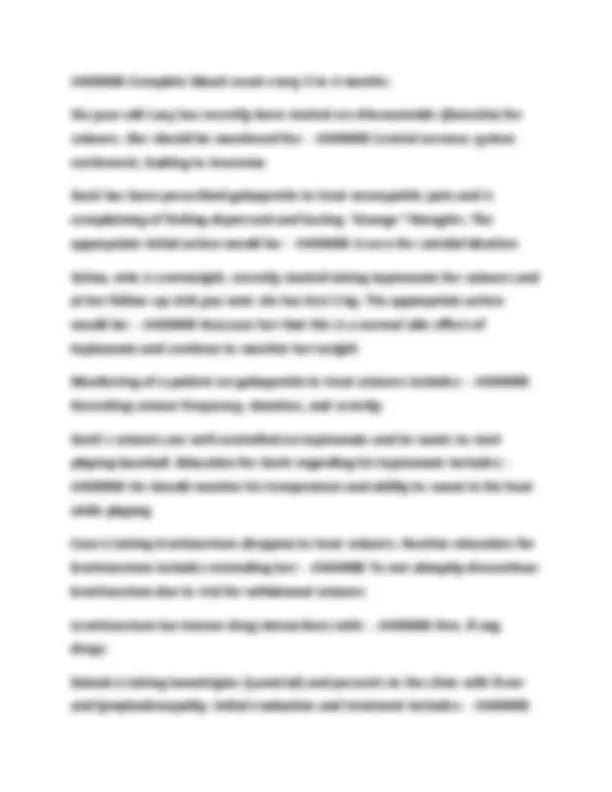
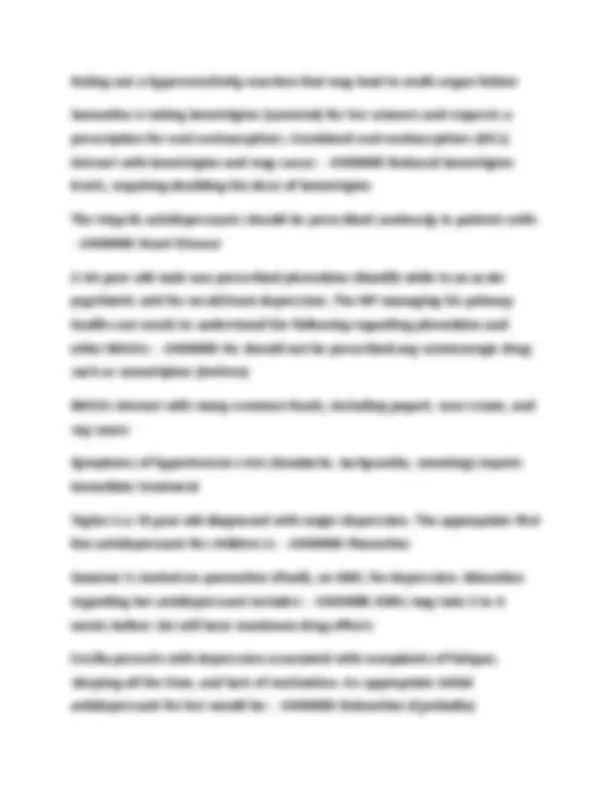
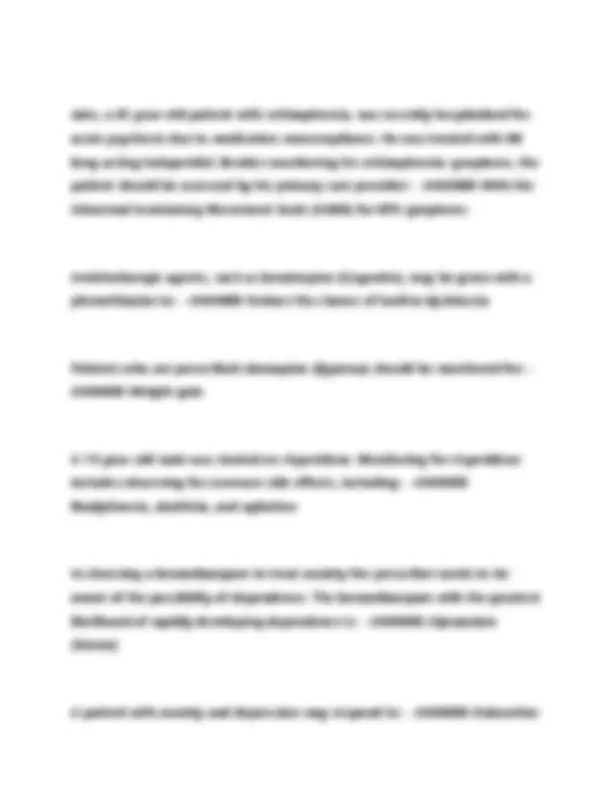
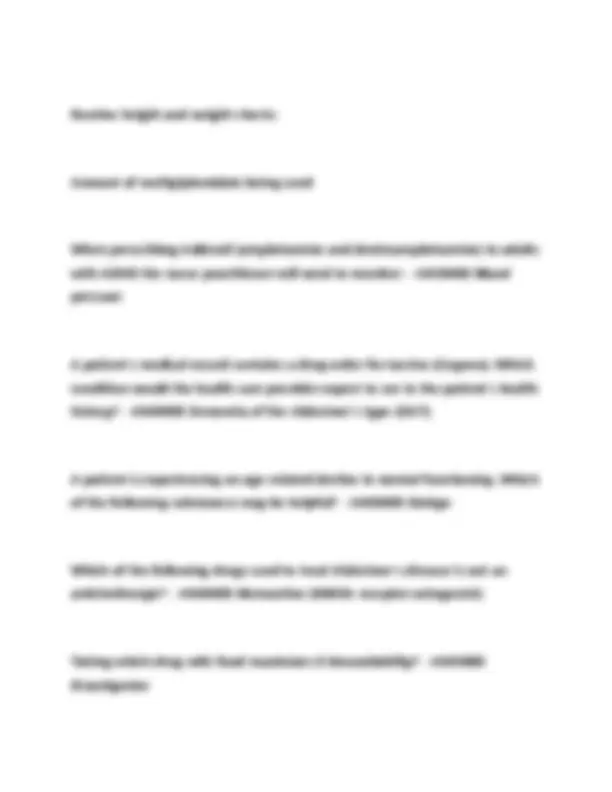
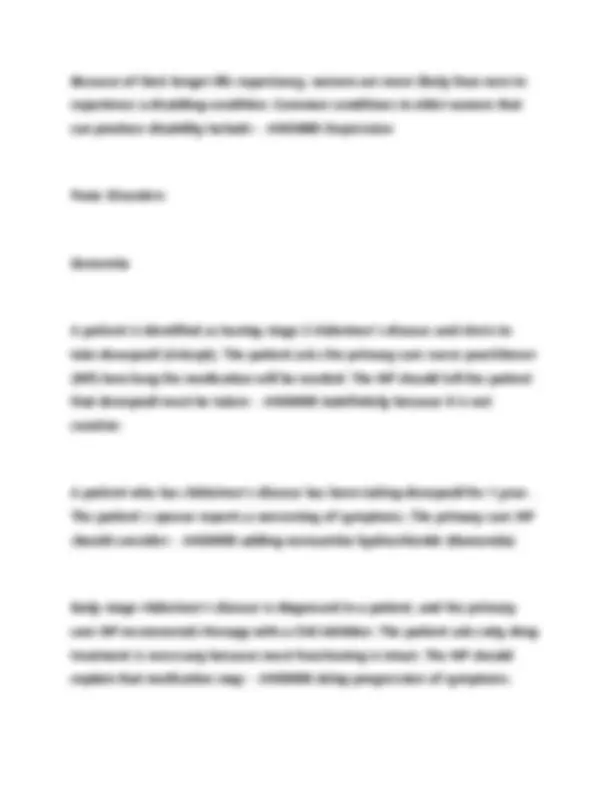
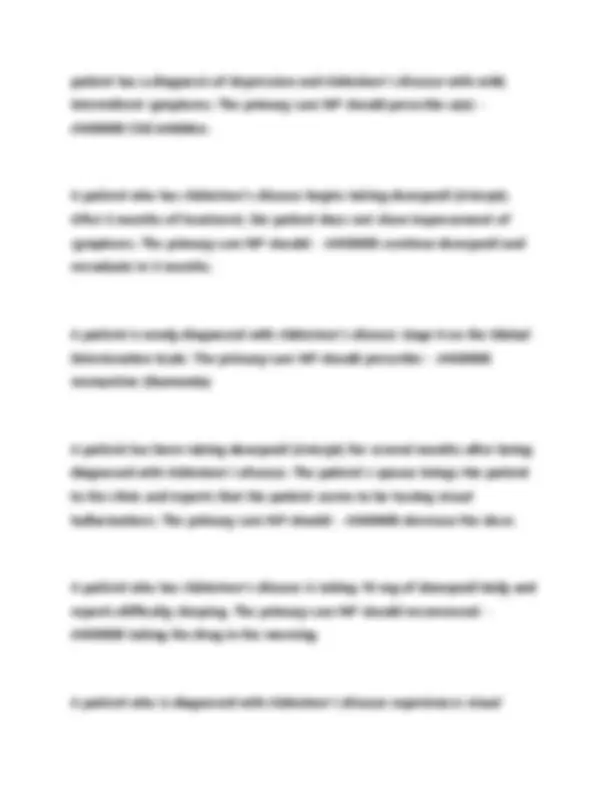

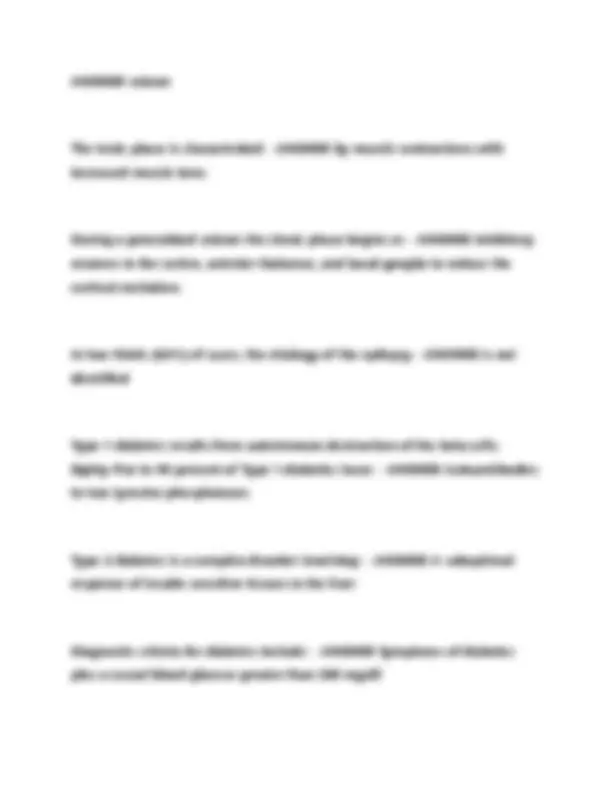
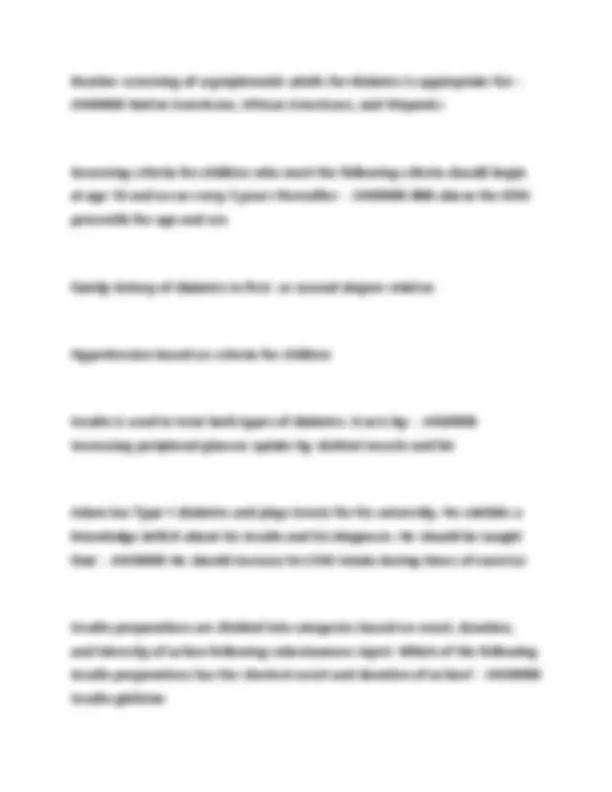
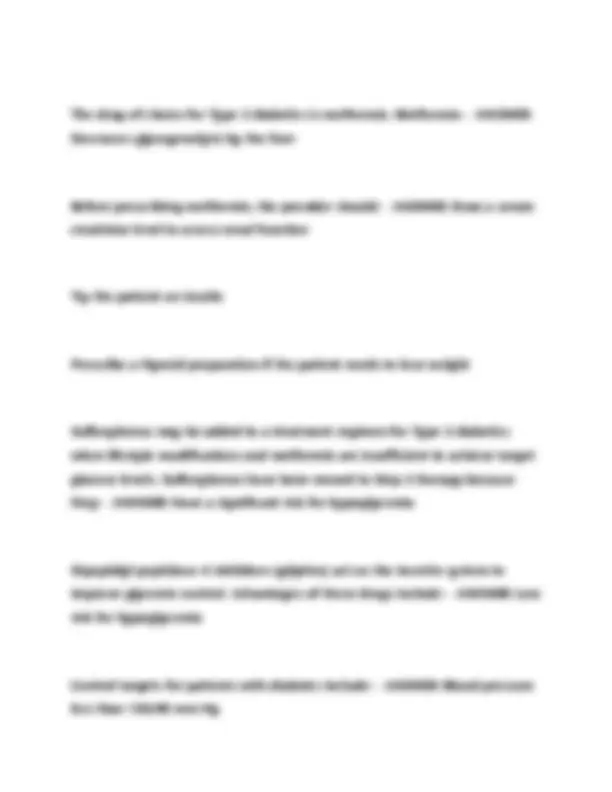
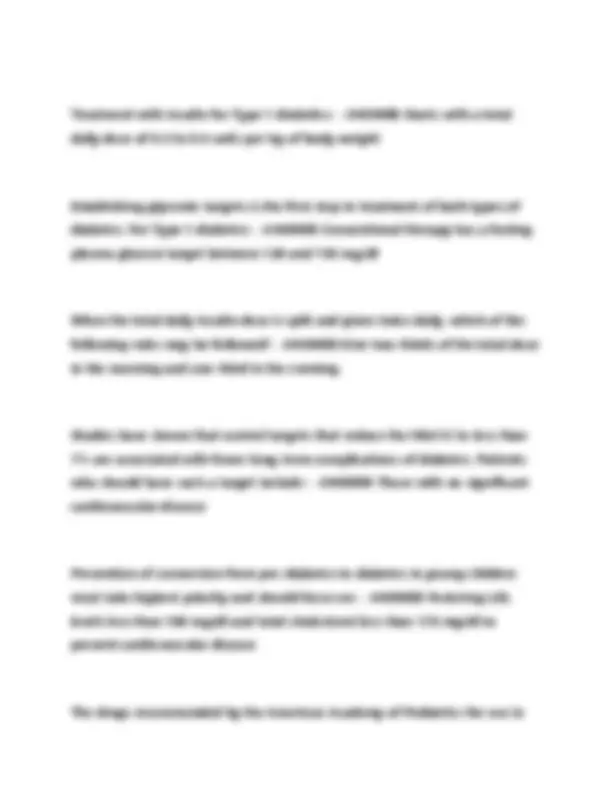

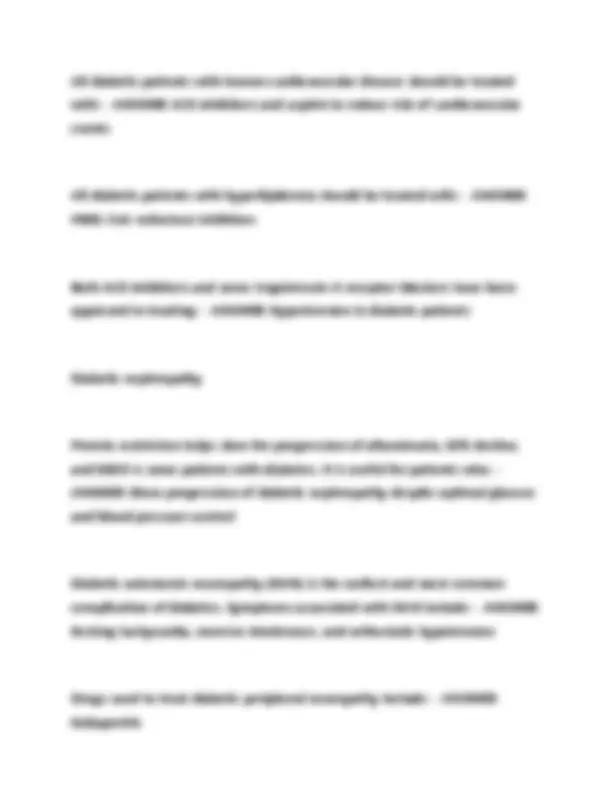
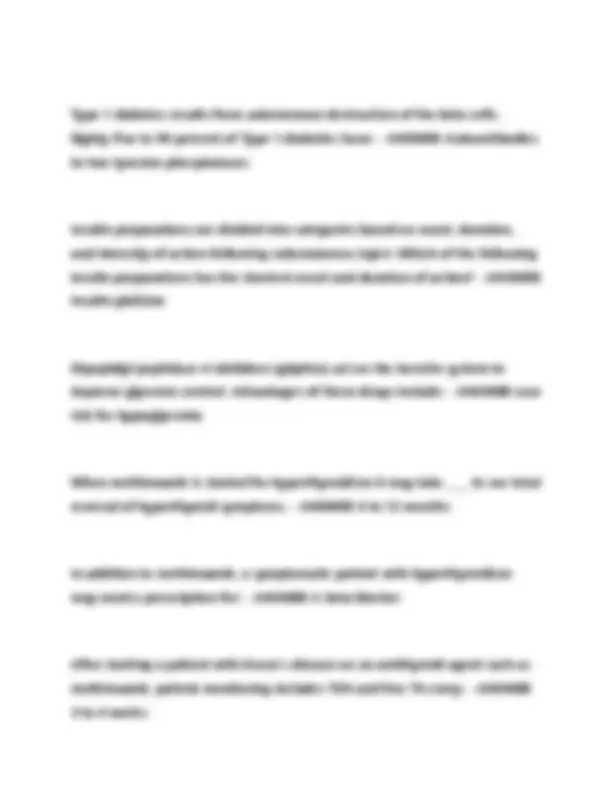

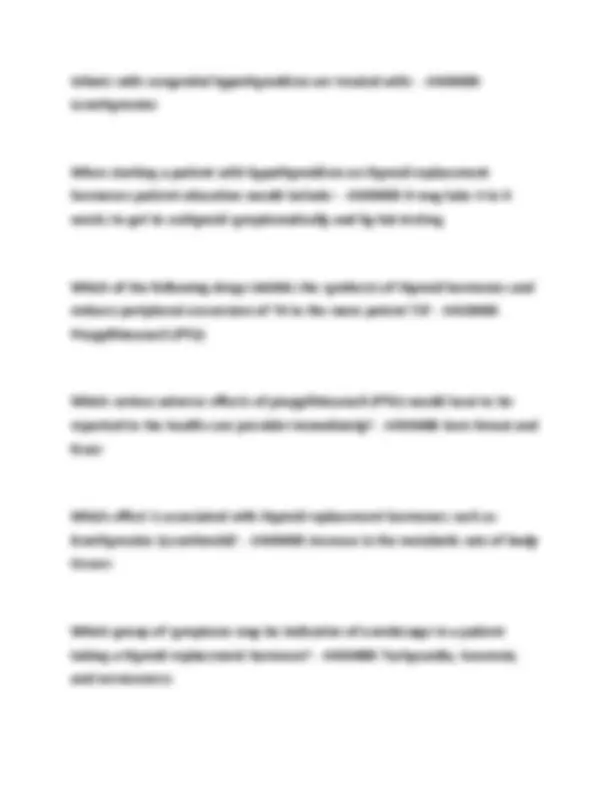

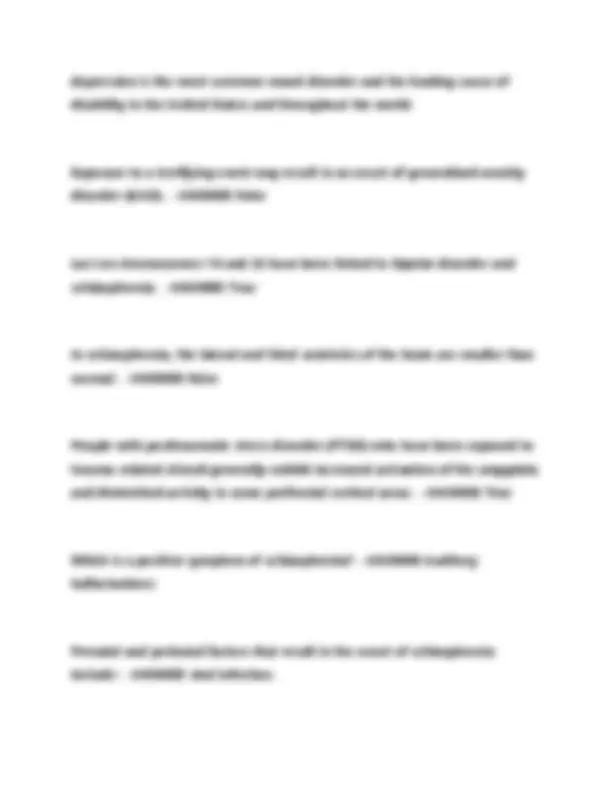
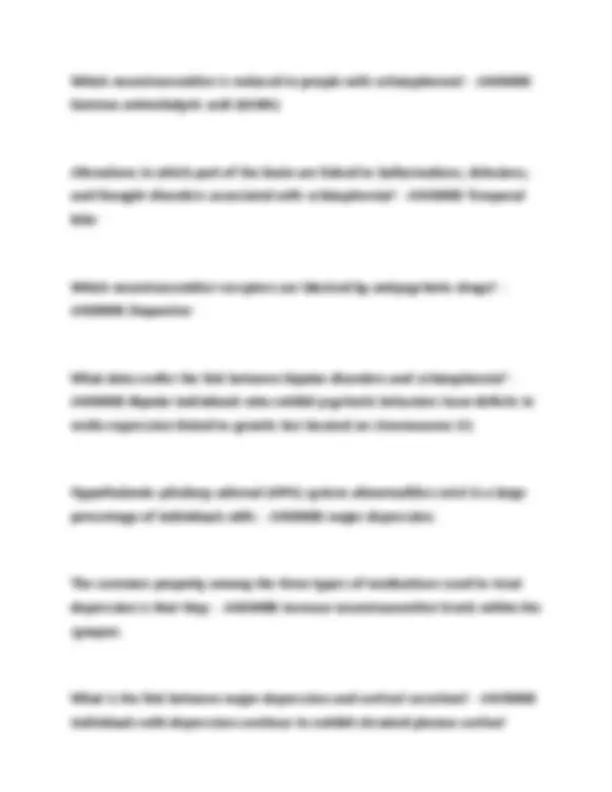
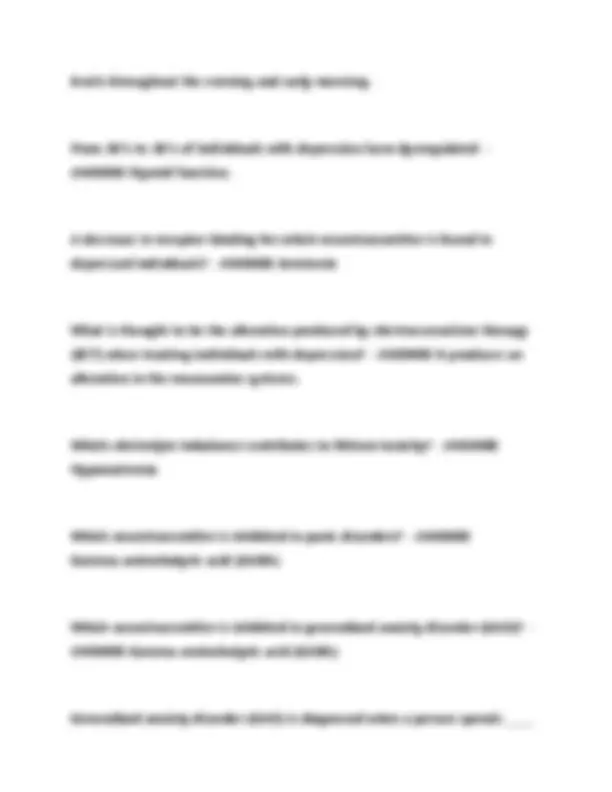
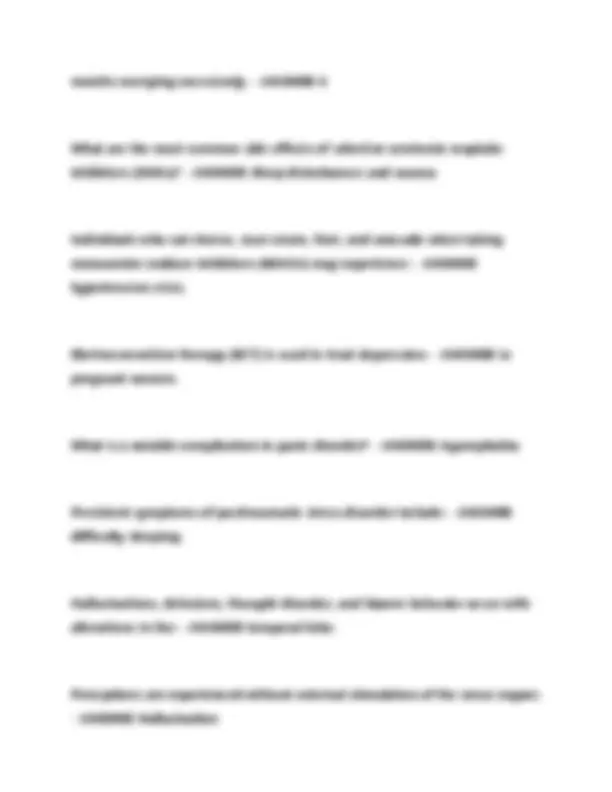

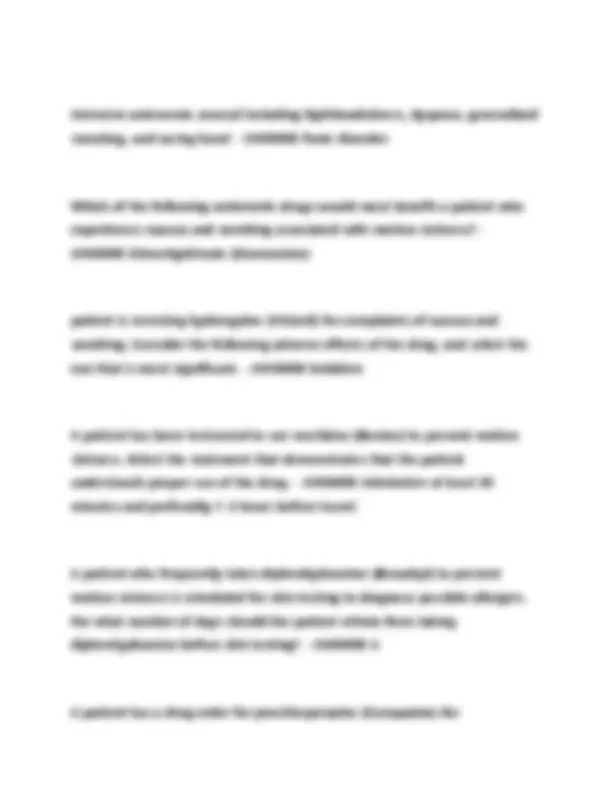

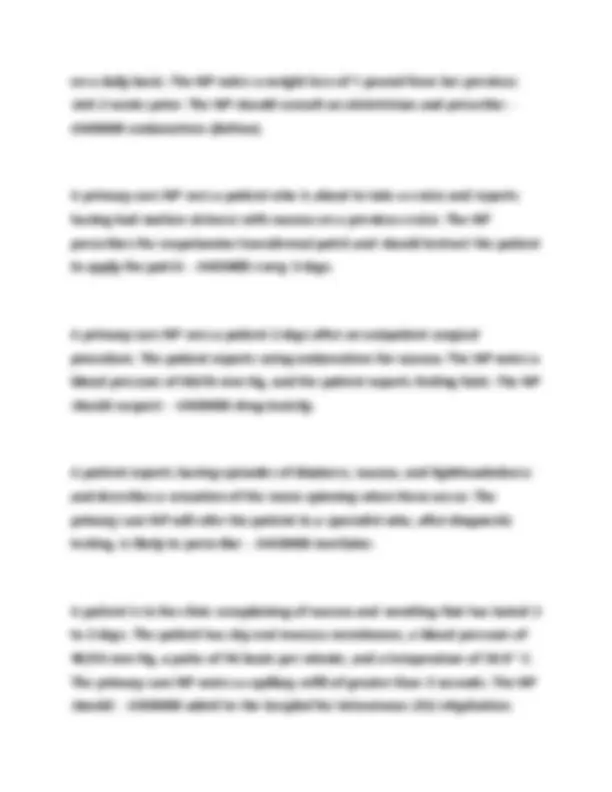
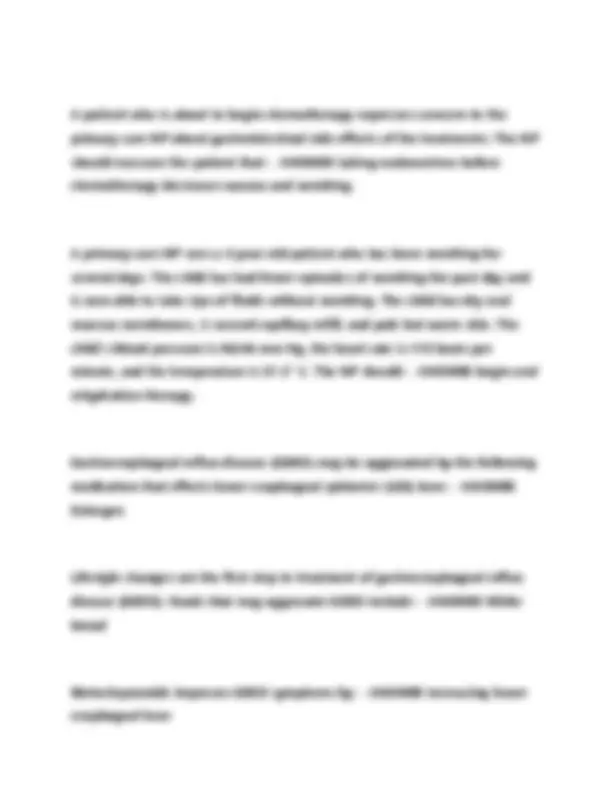




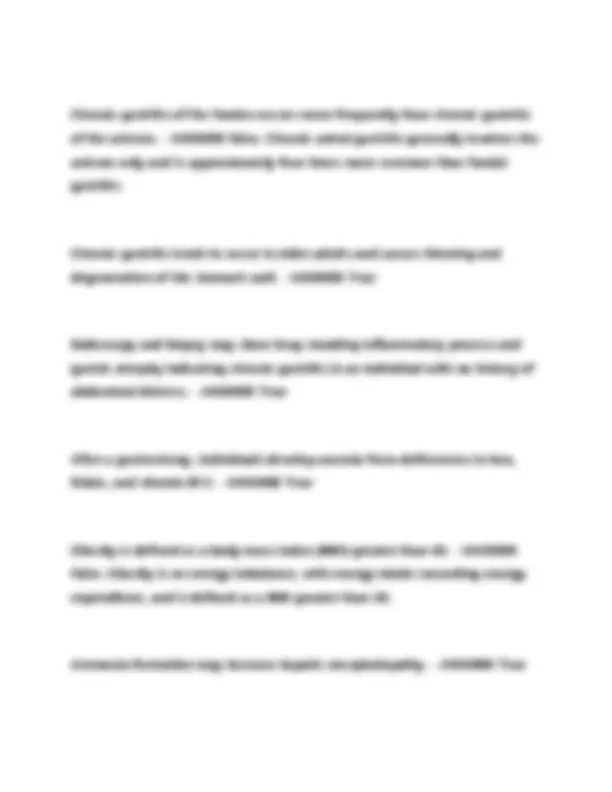
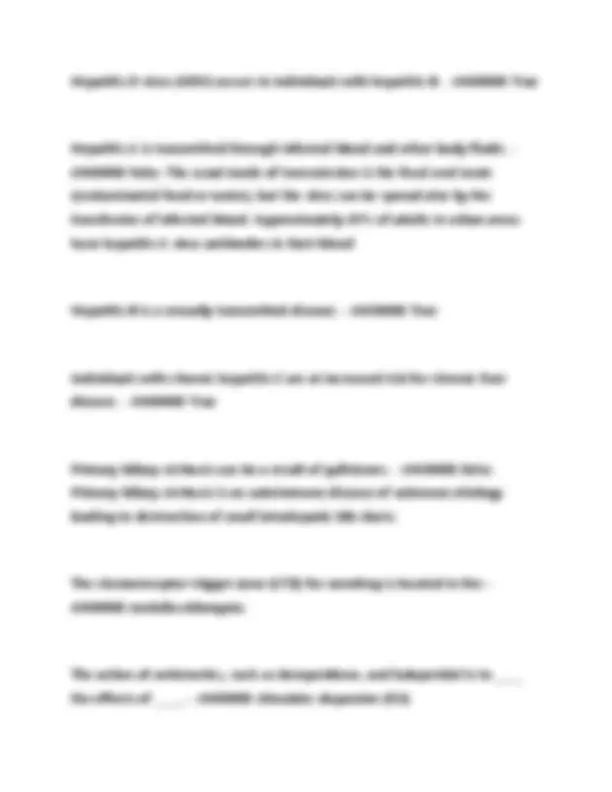
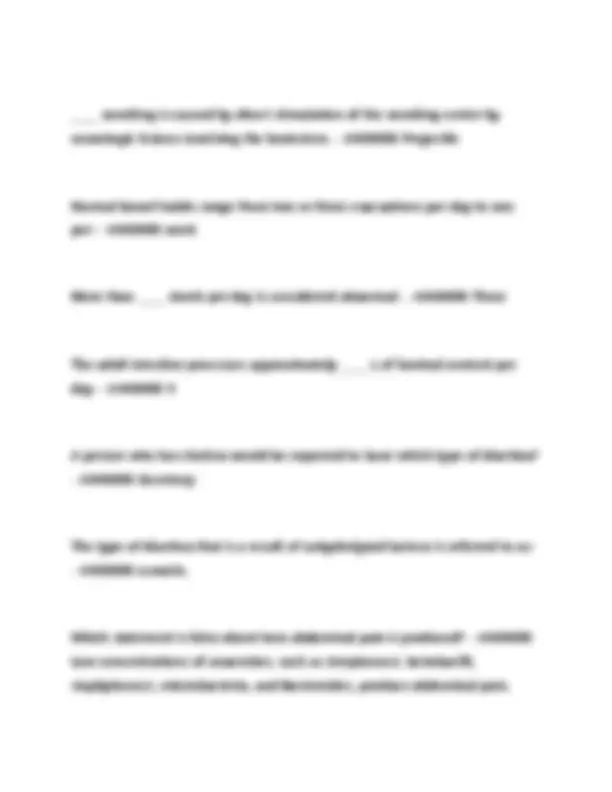

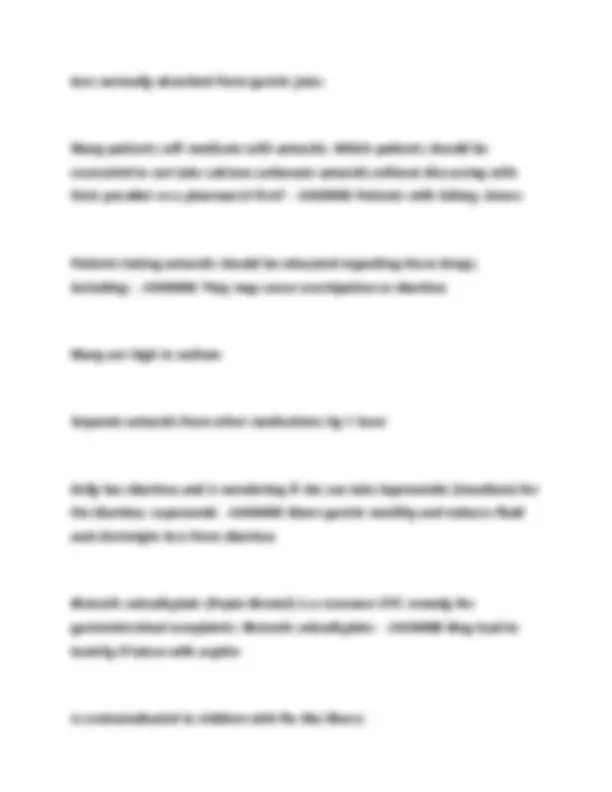
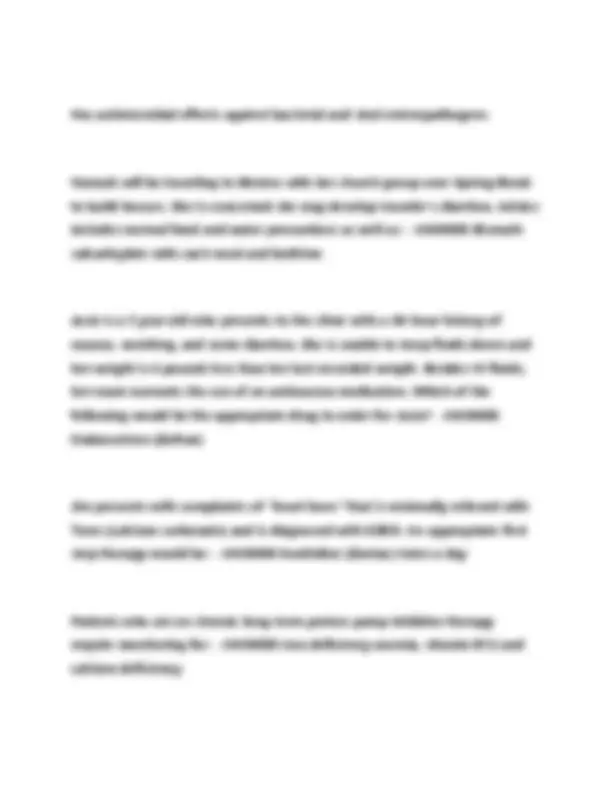
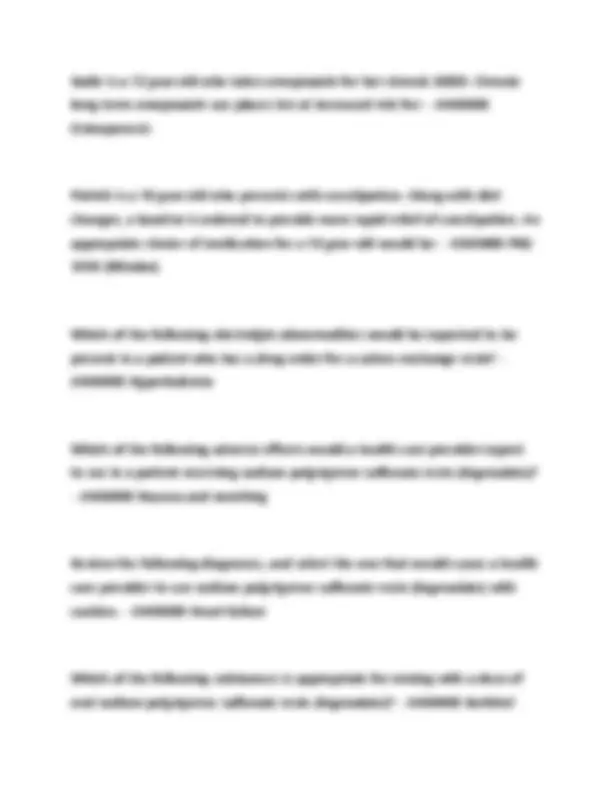
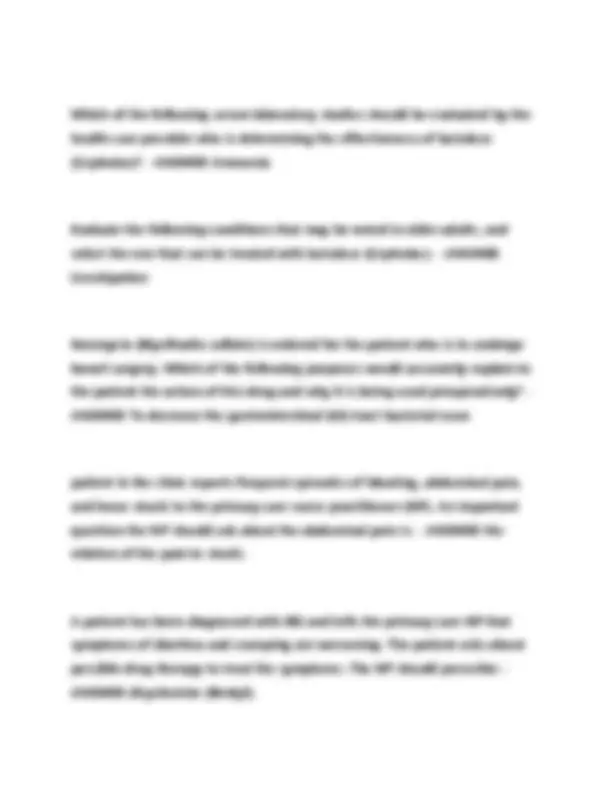
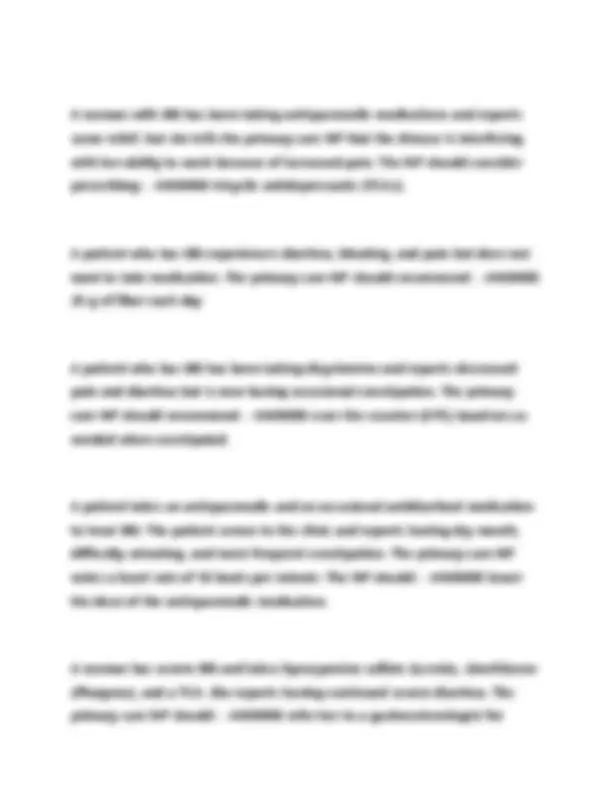
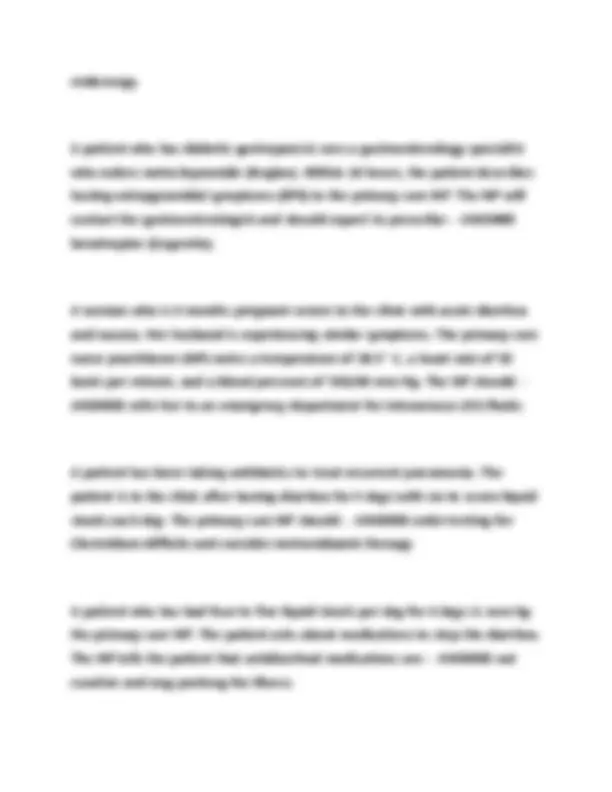
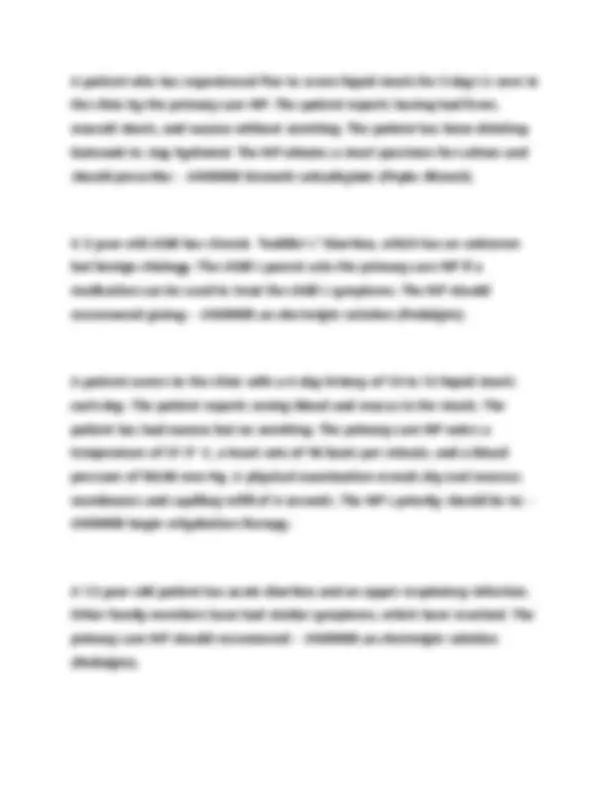
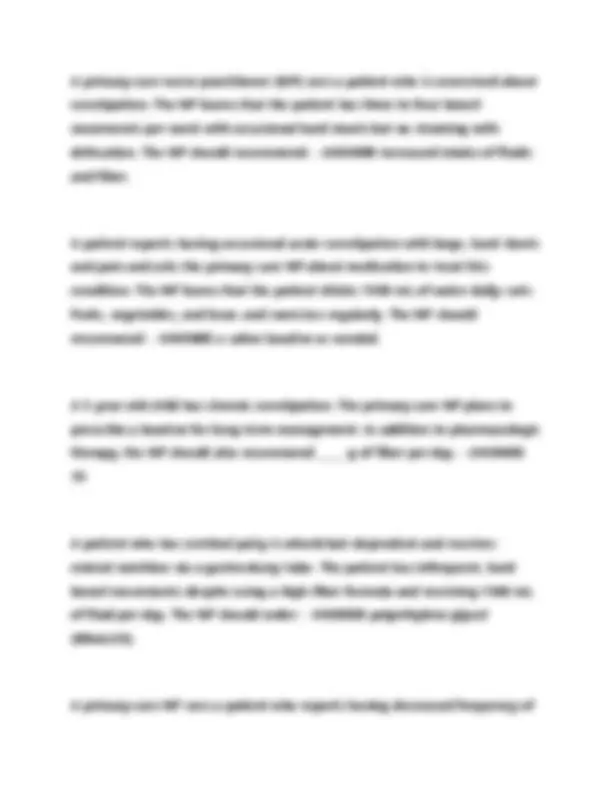
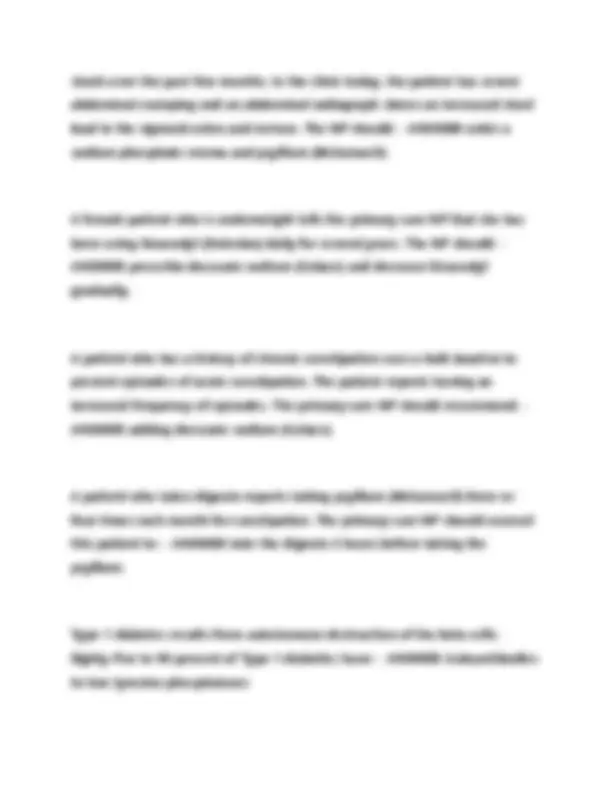



Study with the several resources on Docsity

Earn points by helping other students or get them with a premium plan


Prepare for your exams
Study with the several resources on Docsity

Earn points to download
Earn points by helping other students or get them with a premium plan
Community
Ask the community for help and clear up your study doubts
Discover the best universities in your country according to Docsity users
Free resources
Download our free guides on studying techniques, anxiety management strategies, and thesis advice from Docsity tutors
This pharmacology test bank offers a comprehensive collection of multiple-choice questions and verified answers covering various aspects of medication management. the questions focus on the treatment of migraine headaches, including abortive and preventative therapies, and the management of diabetes and seizures. it's a valuable resource for students and professionals seeking to enhance their knowledge in pharmacology.
Typology: Exams
1 / 58

This page cannot be seen from the preview
Don't miss anything!



















































The American Diabetic Association has recommended which of the following tests for ongoing management of diabetes? - ANSWER HbA1C
A patient who has migraine headaches takes sumatriptan as abortive therapy. The patient tells the primary care nurse practitioner (NP) that the sumatriptan is effective for stopping symptoms but that the episodes are occurring three to four times per month. The NP should consider the addition of: - ANSWER topiramate.
A patient comes to the clinic concerned about possible migraine headaches. The primary care NP conducts a history and physical examination, and the patient describes vise-like pressure in the back of the head that occurs almost daily during the work week. The NP should recommend: - ANSWER acetaminophen.
A patient comes to the clinic and reports recurrent headaches. The patient has a headache diary, which reveals irritability and food cravings followed the next day by visual disturbances and unilateral right-sided headache, nausea, and photophobia lasting 2 to 3 days. The NP should recognize these symptoms as _____ migraine. - ANSWER classic
patient who has migraine headaches tells the primary care NP that drinking coffee and taking nonsteroidal antiinflammatory drugs (NSAIDs) seems to help with discomfort. The NP should tell the patient that: - ANSWER this combination can lead to longer lasting headache pain.
A patient takes rizatriptan (Maxalt) to abort migraine headaches but tells the primary care NP that the headaches have become more frequent since a promotion at work. The NP's initial response should be to: - ANSWER stress the importance of establishing new routines.
A primary care NP prescribes sumatriptan for abortive treatment of migraine headaches. The patient returns to the clinic 1 month later to report increased frequency of the headaches. The NP should: - ANSWER ask the patient how often the sumatriptan is used each week.
A patient who has migraine headaches without an aura reports difficulty treating the migraines in time because they come on so suddenly. The patient has been using over-the-counter NSAIDs. The primary care NP should prescribe: - ANSWER sumatriptan (Imitrex).
A patient who has mild to moderate migraine headaches has severe nausea and vomiting with each episode. For the best treatment of this patient, the primary care NP should prescribe: - ANSWER triptan nasal spray.
A patient who has migraine headaches usually has two to three severe migraines each month. The patient has been using a triptan nasal spray but reports little relief and is concerned about missing so many days of work. The primary care NP should consider: - ANSWER an injectable triptan plus an oral corticosteroid.
A patient who experiences migraines characterized by unilateral motor and sensory symptoms tells the primary care NP that despite abortive therapy with a triptan, the frequency of episodes has increased to three or four times each month. The NP - ANSWER prescribe an anticonvulsant such as topiramate.
it works well for her friend. Appropriate decision making would be: - ANSWER Prescribe Maxalt and arrange to have her observed in the clinic or urgent care with the first dose
Kelly is a 14 year old who presents to clinic with a classic migraine. She says she is having a headache two to three times a month. The initial plan would be: - ANSWER Prescribe NSAIDs as abortive therapy and have her keep a headache diary to identify her triggers
Jayla is a 9 year old who has been diagnosed with migraines for almost 2 years. She is missing up to a week of school each month. Her headache diary confirms she averages four or five migraines per month. Which of the following would be appropriate? - ANSWER Prescribe propranolol (Inderal) to be taken daily for at least 3 months
Amber is a 24 year old who has had migraines for 10 years. She reports a migraine on average of once a month. The migraines are effectively aborted with naratriptan (Amerge). When refilling Amber's naratriptan education would include: - ANSWER A.Naratriptan will interact with antidepressants, including SSRIs and St John's Wort, and she should inform any providers she sees that she has migraines
BContinue to monitor her headaches, if the migraine is consistently happening around her menses there is preventive therapy available
C.Pregnancy is contraindicated when taking a triptan
When prescribing for migraine, patient education includes: - ANSWER Stress reduction and regular sleep are integral to migraine treatment
Juanita presents to clinic with a complaint of headaches off and on for months. She reports they feel like someone is "squeezing" her head. She occasionally takes Tylenol for the pain, but usually just "toughs it out." Initial treatment for tension headache includes asking her to keep a headache diary and a prescription for: - ANSWER Naproxen (Aleve)
Nonpharmacologic therapy for tension headaches includes: - ANSWER A. Biofeedback
B. Stress management
C.Massage therapy
James has been diagnosed with cluster headaches. Appropriate acute therapy would be: - ANSWER Oxygen 100% for 15 to 30 minutes
Preventative therapy for cluster headaches includes: - ANSWER Ergotamine nightly before bed
When prescribing any headache therapy, appropriate use of medications needs to be discussed to prevent medication-overuse headaches. The clinical characteristics of medication-overuse headaches include: - ANSWER Headaches recur when medication wears off
Antonia is a 3 year old who has a history of status epilepticus. Along with her routine antiseizure medication, she should also have a home prescription for____ to be used for an episode of status epilepticus. - ANSWER Rectal diazepam (Diastat)
Rabi is being prescribed phenytoin for seizures. Monitoring includes: - ANSWER Assessing for phenytoin hypersensitivity syndrome 3 to 8 weeks after starting treatment
levetiracetam due to risk for withdrawal seizures
Levetiracetam has known drug interactions with: - ANSWER Few, if any, drugs
Zainab is taking lamotrigine (Lamictal) and presents to the clinic with fever and lymphadenopathy. Initial evaluation and treatment includes: - ANSWER Ruling out a hypersensitivity reaction that may lead to multi-organ failure
Samantha is taking lamotrigine (Lamictal) for her seizures and requests a prescription for oral contraceptives. Combined oral contraceptives (OCs) interact with lamotrigine and may cause: - ANSWER Reduced lamotrigine levels, requiring doubling the dose of lamotrigine
Which of the following is the mechanism by which the selective serotonin reuptake inhibitor (SSRI) antidepressant drugs appear to work? - ANSWER Blocking reuptake of serotonin and norepinephrine
The health care provider teaches a patient beginning tricyclic antidepressant drug therapy about measures to minimize the most serious common adverse drug effects. Which of the following adverse reactions is considered the most serious? - ANSWER Orthostatic hypotension
A patient receiving a tricyclic antidepressant complains of constipation. What is the health care provider's interpretation of the patient's complaint? - ANSWER It is a common side effect of the drug.
A patient has begun taking fluoxetine (Prozac) for depression. When will the effects of the drug first be felt? - ANSWER 1-4 weeks
Phenelzine (Nardil) has been discontinued as a drug order for a patient. How much time must be observed before the patient can start a new drug? -
ANSWER 2 weeks
The patient has been started on a treatment regimen which includes the use of lithium. As part of the teaching plan regarding lithium, the patient should be instructed that he should avoid: - ANSWER Becoming dehydrated
The patient has been started on a treatment regimen for acute mania. As part of the teaching plan for the patient and the family regarding use of the medication, they should be taught to immediately report which of the following symptoms to the primary care provider? - ANSWER Deterioration of sleep pattern
An appropriate first-line drug for the treatment of depression with fatigue and low energy would be: - ANSWER Venlafaxine (Effexor)
The laboratory monitoring required when a patient is on an SSRI is: - ANSWER There is no laboratory monitoring required
Jaycee has been on escitalopram (Lexapro) for a year and is willing to try tapering off of the SSRI. What is the initial dosage adjustment when starting a taper off antidepressants? - ANSWER Reduce dose by 50% for 3 to 4 days
Which of the following are believed to be risk factors for depression? Select all that apply. - ANSWER Age 20-40 years
Positive family history
Separation or divorce
Chronic low self-esteem
Experience with abusive relationships
Third trimester of pregnancy
may be expected to occur with this drug? - ANSWER Daytime sedation
Which of the following medications is the only drug available to treat sleep disorders during pregnancy? - ANSWER Diphenhydramine
The patient is experiencing a reduction in her dosage of a benzodiazepine after 10 years of heavy use. Select the adverse effect which the health care provider expects will result from such a reduction. - ANSWER Tachycardia
A patient is receiving dextroamphetamine (Dexedrine). Review the following symptoms, and select the one for which the health care provider assesses the patient. - ANSWER Irritability
Which symptom would the health care provider expect to see in a patient receiving methamphetamine (Desoxyn)? - ANSWER Suppressed appetite
A patient is receiving methylphenidate (Ritalin) for the treatment of narcolepsy. What long-term effects should the health care provider expect to monitor in this patient? - ANSWER Drug tolerance
When prescribing Adderall (amphetamine and dextroamphetamine) to adults with ADHD the nurse practitioner will need to monitor: - ANSWER Blood pressure
Monitoring for a child on methylphenidate for ADHD includes: - ANSWER ADHD symptoms
Routine height and weight checks
Amount of methylphenidate being used
Jack, age 8, has attention deficit disorder (ADD) and is prescribed methylphenidate (Ritalin). He and his parents should be educated about the
side effects of methylphenidate, which are: - ANSWER Insomnia and decreased appetite
An adult patient reports feeling unfocused all the time, loses things, and has difficulty completing tasks and says that this is interfering with family relations and work. The symptoms have been present as long as the patient can remember, although there is no previous documentation of attention-deficit/hyperactivity disorder (AD/HD) in this patient's medical history. The primary care nurse practitioner (NP) should: - ANSWER conduct a thorough evaluation to document behaviors associated with AD/HD and begin treatment if indicated.
child is taking methylphenidate (Ritalin) for AD/HD. The child's parent calls the primary care NP to report increased behavior problems and delusional thinking. The NP should: - ANSWER discontinue the medication.
A primary care NP sees a child for an annual well-child check-up. The child has been taking methylphenidate for AD/HD for 3 months. The NP should discontinue the medication if which symptom is present? - ANSWER Motor tics
A child is diagnosed with AD/HD after being expelled from school for disruptive behaviors. The child's parents are reluctant to start medication because of the stigma attached. The primary care NP should suggest: - ANSWER Concerta.
A child has been taking methylphenidate 5 mg at 8 AM, 12 PM, and 4 PM for 30 days after a new diagnosis of AD/HD and comes to the clinic for evaluation. The child's mother reports that the child exhibits some nervousness and insomnia but is doing much better in school. The primary care NP should suggest: - ANSWER discontinuing the 4 PM dose
ANSWER Complete blood count every 3 to 4 months
Six-year-old Lucy has recently been started on ethosuximide (Zarontin) for seizures. She should be monitored for: - ANSWER Central nervous system excitement, leading to insomnia
Sook has been prescribed gabapentin to treat neuropathic pain and is complaining of feeling depressed and having "strange" thoughts. The appropriate initial action would be: - ANSWER Assess for suicidal ideation
Selma, who is overweight, recently started taking topiramate for seizures and at her follow-up visit you note she has lost 3 kg. The appropriate action would be: - ANSWER Reassure her that this is a normal side effect of topiramate and continue to monitor her weight
Monitoring of a patient on gabapentin to treat seizures includes: - ANSWER Recording seizure frequency, duration, and severity
Scott's seizures are well controlled on topiramate and he wants to start playing baseball. Education for Scott regarding his topiramate includes: - ANSWER He should monitor his temperature and ability to sweat in the heat while playing
Cara is taking levetiracetam (Keppra) to treat seizures. Routine education for levetiracetam includes reminding her: - ANSWER To not abruptly discontinue levetiracetam due to risk for withdrawal seizures
Levetiracetam has known drug interactions with: - ANSWER Few, if any, drugs
Zainab is taking lamotrigine (Lamictal) and presents to the clinic with fever and lymphadenopathy. Initial evaluation and treatment includes: - ANSWER
Ruling out a hypersensitivity reaction that may lead to multi-organ failure
Samantha is taking lamotrigine (Lamictal) for her seizures and requests a prescription for oral contraceptives. Combined oral contraceptives (OCs) interact with lamotrigine and may cause: - ANSWER Reduced lamotrigine levels, requiring doubling the dose of lamotrigine
The tricyclic antidepressants should be prescribed cautiously in patients with:
A 66-year-old male was prescribed phenelzine (Nardil) while in an acute psychiatric unit for recalcitrant depression. The NP managing his primary health care needs to understand the following regarding phenelzine and other MAOIs: - ANSWER He should not be prescribed any serotonergic drug such as sumatriptan (Imitrex)
MAOIs interact with many common foods, including yogurt, sour cream, and soy sauce
Symptoms of hypertensive crisis (headache, tachycardia, sweating) require immediate treatment
Taylor is a 10 year old diagnosed with major depression. The appropriate first line antidepressant for children is: - ANSWER Fluoxetine
Suzanne is started on paroxetine (Paxil), an SSRI, for depression. Education regarding her antidepressant includes: - ANSWER SSRIs may take 2 to 6 weeks before she will have maximum drug effects
Cecilia presents with depression associated with complaints of fatigue, sleeping all the time, and lack of motivation. An appropriate initial antidepressant for her would be: - ANSWER Duloxetine (Cymbalta)
(Cymbalta)
When prescribing temazepam (Restoril) for insomnia, patient education includes: - ANSWER Temazepam should not be used more than three times a week for less than 3 months
Patients should be instructed regarding the rapid onset of zolpidem (Ambien) because: - ANSWER Zolpidem should be taken just before going to bed
One major drug used to treat bipolar disease is lithium. Because lithium has a narrow therapeutic range, it is important to recognize symptoms of toxicity, such as: - ANSWER Drowsiness and nausea
Tom is taking lithium for bipolar disorder. He should be taught to: - ANSWER Eat a diet with consistent levels of salt (sodium)
Cynthia is taking valproate (Depakote) for seizures and would like to get pregnant. What advice would you give her? - ANSWER Valproate is a known teratogen, but may be taken after the first trimester if necessary.
When prescribing an opioid analgesic such as acetaminophen and codeine (Tylenol #3), instructions to the patient should include: - ANSWER The
medication may cause sedation and they should not drive
Constipation is a common side effect and they should increase fluids and fiber
Patients should not take any other acetaminophen-containing medications at the same time
Kirk sprained his ankle and is asking for pain medication for his mild-to-moderate pain. The appropriate first line medication would be: - ANSWER Ibuprofen (Advil)
Kasey fractured his ankle in two places and is asking for pain medication for his pain. The appropriate first line medication would be: - ANSWER Acetaminophen with hydrocodone (Vicodin)
Jack, age 8, has attention deficit disorder (ADD) and is prescribed methylphenidate (Ritalin). He and his parents should be educated about the side effects of methylphenidate, which are: - ANSWER Insomnia and decreased appetite
Monitoring for a child on methylphenidate for ADHD includes: - ANSWER ADHD symptoms
Because of their longer life expectancy, women are more likely than men to experience a disabling condition. Common conditions in older women that can produce disability include: - ANSWER Depression
Panic Disorders
Dementia
A patient is identified as having stage 2 Alzheimer's disease and elects to take donepezil (Aricept). The patient asks the primary care nurse practitioner (NP) how long the medication will be needed. The NP should tell the patient that donepezil must be taken: - ANSWER indefinitely because it is not curative.
A patient who has Alzheimer's disease has been taking donepezil for 1 year. The patient's spouse reports a worsening of symptoms. The primary care NP should consider: - ANSWER adding memantine hydrochloride (Namenda)
Early-stage Alzheimer's disease is diagnosed in a patient, and the primary care NP recommends therapy with a ChE inhibitor. The patient asks why drug treatment is necessary because most functioning is intact. The NP should explain that medication may: - ANSWER delay progression of symptoms.
patient has a diagnosis of depression and Alzheimer's disease with mild, intermittent symptoms. The primary care NP should prescribe a(n): - ANSWER ChE inhibitor.
A patient who has Alzheimer's disease begins taking donepezil (Aricept). After 3 months of treatment, the patient does not show improvement of symptoms. The primary care NP should: - ANSWER continue donepezil and reevaluate in 3 months.
A patient is newly diagnosed with Alzheimer's disease stage 6 on the Global Deterioration Scale. The primary care NP should prescribe: - ANSWER memantine (Namenda)
A patient has been taking donepezil (Aricept) for several months after being diagnosed with Alzheimer's disease. The patient's spouse brings the patient to the clinic and reports that the patient seems to be having visual hallucinations. The primary care NP should: - ANSWER decrease the dose.
A patient who has Alzheimer's disease is taking 10 mg of donepezil daily and reports difficulty sleeping. The primary care NP should recommend: - ANSWER taking the drug in the morning.
A patient who is diagnosed with Alzheimer's disease experiences visual